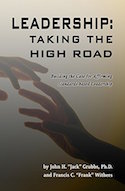How Thinking Can Improve One's Leadership
By Lieutenant Colonel (Retired) Joe Doty, Ph.D. , Sunday, January 01, 2017
What does thinking have to do with leadership or being a good leader? I would argue it is has a great deal and could make the difference between being below average, mediocre, or great. It seems intuitive that people would be better at doing something they think more about than those things they don’t think about.
A quick story - a senior cadet at West Point was caught having plagiarized a large portion of a paper. After being caught, the cadet lied about it. The cadet’s punishment included being enrolled in West Point’s Honor Mentorship Program – a 6-month intensive one-on-one mentoring session with a faculty member (to include many hours of journaling, research, and conversations). During one of mentoring sessions, the cadet, clearly frustrated and exacerbated, exclaimed, “I just wasn’t thinking, I acted without thinking!”
Was this cadet’s, a future leader in our military, lack or absence of thinking (“I just acted without thinking”) in this specific context surprising? I don’t think so. Individuals think about things that are important to them and things in which they are interested. Coaches’ jobs are to win games; therefore, they spend the vast majority of their time thinking about how to win games and gain competitive advantages. This makes perfect sense and appears to be common sense. Politicians think about how best to serve their constituents while still getting reelected. CEOs think about serving their customers and stakeholders with their best products and services while striving to make a profit. Writers think about writing books and articles that will be interesting and sell. Photographers think about taking the best pictures they can. Chefs think about making delicious meals. This list can go on and on. What do leaders think about?! What should they think about?
It seems intuitive that people in general would focus on what is important to them – work, winning games, information technology, money, intelligence gathering, relationships, cars, food, clothes, etc. Interestingly, how many people who are in leadership positions really think about:
- their role as leaders
- their responsibilities as leaders
- their leadership style
- if and when they should alter that style (situational leadership)
- who they are leading; what is unique about each of their followers
- the effect of their leadership on their followers
- the effect of their leadership the organization’s culture and climate
- the effect of their leadership on the ethical climate in their organization
- what areas of their leadership they need to improve/change
And if leaders do think about such things, how often do they do it? Does any of this thinking result in a changed way of thinking, leading, or some behavioral change?
To parlay this line of discussion, two popular and historical psychological studies, the Stanford Prison Study[i] and the Milgram Experiment[ii] suggested that individuals can get so psychologically and/or emotionally caught up in whatever it is they are doing that ethical thinking does not seem to prevail or guide behavior. The aberrant behavior of a few members of U.S. military at the Abu Ghraib prison during the Iraq war appears to be a real-world example of the Stanford Prison Study and an example of a lack of ethical thinking. And clearly many of the perpetrators of the Holocaust during World War II were not ethically thinking. The story and trial of Adolf Eichmann[iii], a key player in the death of many Jewish civilians during the Holocaust, is a classic example and reminder of how evil some individuals can act by not thinking ethically.
Although these examples have to do with thinking ethically (clearly a requirement for leaders), they point to the need for leaders to be conscious of their own thinking (meta-cognition). The research suggests that leaders who don’t think about what they are thinking about are less likely to be ethically sensitive – and thus act ethically or set an ethical organizational culture.
Nathanial Braden discusses a lack of thinking or non-thinking (or mindlessness) by noting that “one of the ways we avoid taking responsibility for our actions when doing something we are not proud of or will be ashamed of later is to blank out awareness, in the moment of action, that it is we who are doing what we are doing”.[iv] It is important to note that mindlessness does not mean a leader’s brain is not functioning – it means a leader task is being performed without the leader thinking about it (this is more common than we may think). For example, leaders can drive their cars while thinking about their kids’ upcoming soccer game or what movie they are going to see that night. A leader can be sitting in on an important meeting while daydreaming about an upcoming vacation. How often have we caught ourselves daydreaming or saying “what was I thinking?”
Developing or increasing the self-awareness of leaders can and should increase their ability to be cognizant of their thinking. Self-awareness is an individual’s ability to monitor and control his or her thoughts, feelings, and emotions. A highly self-aware leader intentionally and habitually thinks about, and is conscious of, what they are thinking, feeling, and doing and why they are feeling that way, thinking that way, and doing what they are doing. Examples of what this looks and sounds like for leaders could include:
1. What am I thinking about right now, and why am I thinking about that?
2. Should I be thinking about something else right now?
3. Are there other ways to think about what I am thinking about?
4. What am I feeling right now, and why am I feeling that way? Is this feeling an overreaction to something or an appropriate reaction?
5. Am I treating this subordinate the way he or she should be treated?
This type of thinking about one’s thinking is not a dogmatic, laborious, and time-consuming effort. With practice, addressing questions on one’s thinking can occur in seconds.
Improving on one’s self-awareness will help leaders more actively think about their thinking. Being self-aware is a conscious choice - it does not just happen. People are not born being self-aware. It is an acquired skill that can be taught, practiced, and developed. Importantly, the self-aware leader will be more likely to think ethically or to at least be more ethically sensitive as they focus on their thinking. Does being more self-aware guarantee more ethical thinking? No. But leaders who practice thinking about the how and why of their thinking are more apt to be open-minded and see ethical issues to which they would have been blind before. Branden succinctly summarizes the freedom of choice all individuals, leaders and followers, have in terms of their own thinking:
1. We are free to focus our mind, or not to bother, or to actively avoid focusing.
2. We are free to think, or not to bother, or to actively avoid thinking.
3. We are free to strive for greater clarity with regard to some issue confronting us, or not to bother, or to actively seek darkness.
4. We are free to examine unpleasant facts or to evade them[v]
To summarize, thinking, and thinking about one’s thinking, is not often thought of as a leader trait or requirement. Thinking about one’s thinking does not come naturally for most people. It is common for leaders to think in ways that support their specific needs (as opposed to the needs of a subordinate), the accomplishment of a specific task, or whether they will be transactional (as opposed to transformational) in their thinking – and, thusly, their actions. As such, the challenge for leaders, who want to be the best they can be, is to improve their self-awareness and, thusly, their thinking.
References:
[i] Zimbardo, P. (2007). The lucifer effect: Understanding how good people turn evil. New York, NY: Random House.
[ii] Milgram, S. (1974). Obedience to authority – An experimental view. London, England: Tavistock Publications.
[iii] Arendt, H. (1963). Eichmann in Jerusalem – A report on the banality of evil. New York, NY: Viking Press.
[iv] Braden, N. (1997). The art of living consciously - the power of awareness to transform everyday life. New York, NY: Simon-Schuster, p.77.
[v] Braden, p. 48.






